- Home
- Muriel Spark
Symposium
Symposium Read online
Muriel Spark
SYMPOSIUM
… the affair even ended in wounds and the party was finally broken up by the shedding of blood.
Symposium (tr. Loeb: The Carousal) of Lucian
… the chief thing which he remembered was Socrates compelling the other two to acknowledge that the genius of comedy was the same with that of tragedy, and that the true artist in tragedy was an artist in comedy also.
Symposium (Jowett translation) of Plato
‘THIS is rape!’ His voice was reaching a pitch it had never reached before and went higher still as he surveyed the wreckage. ‘This is violation!’
It was not rape, it was a robbery.
He was Lord Suzy; his title was hereditary, so that when this was explained to busy people before their meeting him they were inclined to say, ‘Yes, but what about him?’ It is true that he had done nothing very much. He was approaching the dangerous age of fifty, said to be the time of the male menopause. His two previous marriages and divorces had passed like the storms of old sea-voyages.
Helen, the present Lady Suzy, was twenty-two. She stood there sleepy and leggy with her hands up at her short dark hair, amazed. She had been married to Brian Suzy nearly a year, during which she had frequently thought of flight. She had met her husband at the school play where he had come to watch his daughter act in Death of a Salesman, the dramatic society’s choice for that year. Helen was a schoolmate of Pearl, Lord Suzy’s only child and from his second marriage. Pearl was now far away in Manhattan operating a word processor at the United Nations and had written about her ‘honey of a job’, which made Helen feel lonely and envious. Helen’s own parents were divorced. She had missed her father most of all, and that, she said, was probably why she was attracted to older men, and had finally fallen for Brian Suzy.
Helen was still standing distractedly among the wreckage, and the two policemen who had woken them in the middle of the night to tell them their front door was wide open with the front-door lights on, now wanted to leave. They were full of wonder that neither of the couple had heard a sound.
‘Looks like they made a noise, though,’ said one of the policemen.
Helen dropped her hands from her head. ‘I heard a noise and I didn’t,’ she said. ‘At least I dreamt a dream in which there was a noise, so I must have worked the real noise into my dream.’
‘Now she tells us,’ said Brian. ‘First she says she didn’t hear a thing and now she heard it in a dream.’
‘Makes no difference,’ said the other policeman. ‘Just as well you didn’t come down. Might have got bashed.’
When they had gone Helen looked for something intact among the broken bottles. She found some port. In the kitchen where the vandals had not penetrated was a cupboard which contained various bottles of drinks; she pounced on a bottle of brandy, and mixed up her latest-learned brew.
‘Brian!’ she called. He was sitting at the bottom of the staircase with his head in his hands. She brought him a glass of the port and brandy, her mixture, and sat down on the stairs beside him.
‘Rape,’ he said. ‘It feels like rape.’
‘Does it? — I wouldn’t know,’ she said. ‘They took the silver, they took the hi-fi and the Georgian mirror. Then they wrecked the rest.’
It was a Victorian house of three storeys in a quiet street off the Camberwell New Road.
‘Robbery,’ he said, very much more quietly than when he had first met the shock.
‘Haven’t you ever had a robbery before?’ she said. They had not been long enough married to know each other’s detailed histories.
‘No. I’ve lost things. Dishonest servants away back in the past. Inside jobs. My mother lost a ring, too. But I’ve never been robbed like this. Two-thirty, three, in the morning, and I didn’t hear a thing. You didn’t hear a thing, not actually. They could have come up and killed us.’
‘We should have a burglar alarm,’ she said. ‘We have to get one. But they know how to de-activate alarms.’
‘It’s madness to keep silver,’ he said. ‘A lot of work and in the end they steal it.’
‘It was mostly my wedding presents from my family,’ she said. His silver was upstairs in a large safe in his bathroom.
‘I hate wedding presents,’ said Brian. ‘If you had my experience of wedding presents you would feel the same.’
‘It’s true they don’t seem to keep marriages together,’ she said.
‘What’s this stuff we’re drinking?’
‘It’s called jumping juice,’ she said.
‘They’ve pee’d on the walls, you know,’ he said.
‘It’s so awful when they pee on walls and all over your stuff. An outrage.’
The hostess introduces the people who have not met before. ‘Lord and Lady Suzy, that’s Brian and Helen, I want you to meet Roland Sykes; and Annabel Treece you already know. Oh, Ernst, lovely to see you … Ernst Untzinger … You’ve met, oh, good. Ernst, do you know Mr and Mrs Damien, William and Margaret …‘ The host dispenses the drinks. They are a party of ten. The house is in Islington. The room is very beige, with a glimpse of the dining-room which is predominantly kingfisher blue.
The women in the party are extremely diverse, the five men more similar, although they vary in age. The hosts are Hurley Reed, an American painter in his early fifties, and Chris Donovan, a rich Australian widow in her late forties. They live together. It is a union of great convenience and contentment.
Half an hour later the party is seated at the table. Some are new to each other but on the whole the pair of hosts and their eight guests are far better known to each other than they are, at present, to us.
Hurley Reed sits at the head of the table at this dinner for ten with Helen Suzy on his right and Ella Untzinger on his left. At the other end of the table the hostess, grand-looking and rich Chris Donovan, is already having her attention occupied by Brian Suzy who sits on her right. His dark eyes start out from his thin, dark face. ‘They pee’d’, Brian insists, ‘on all the walls.’
Ernst Untzinger, bronze-faced and successful, with hair greying before its time, is placed on Chris Donovan’s left. He has arrived in London on one of his many official trips from Brussels where he sits on one of the international commissions of finance for the European Community. His wife Ella is directly diagonal to him, beside Hurley Reed.
‘Pee’d all over the place,’ says Brian Suzy.
Ernst is anxious to get him off the subject, since dry champagne is being served in tubular glasses; he feels the details of Brian Suzy’s robbery are entirely out of place.
The manservant, not long acquired from the Top-One School of Butlers, assisted by a temporary hand, a young graduate in modern history, are moving round the table in their white coats, serving quite impassively, but Ernst is troubled that they should overhear this talk of Lord Suzy’s, and shows himself altogether relieved when Brian Suzy goes on to list the actual goods missing and damaged.
‘I always say to Hurley’, says Chris Donovan, ‘that every time you turn your back on your stuff you should say goodbye to it. You never know, you may never see it again.’
Margaret Damien is a romantic-looking girl with long dark-red hair, a striking colour, probably natural. She says, ‘There’s a poem by Walter de la Mare:
Look thy last on all things lovely
Every hour …’
Hurley Reed now raises his champagne glass: ‘I would like us to drink to Margaret and William and their future.’ William Damien smiles. Everyone toasts the newly married pair.
Hurley Reed, at his end of the table, is now conversing with Helen Suzy on his right. Helen looks uncomfortable since it is impossible to avoid hearing her husband’s list.
‘That was last week,’ says Helen.
‘Rape,
’ comes her husband’s voice. ‘It felt like rape.’
Helen looks at the plate of salmon mousse that has been softly and silently placed before her. She takes up her fork.
Hurley takes up his and, while passing the tiny rolls to Ella Untzinger on his left, continues his conversation with Helen Suzy. ‘Have you ever heard’, he says quietly, ‘of St Uncumber?’
‘Saint Un-what?’
‘A medieval saint,’ he says, ‘to whom people, especially women, used to pray to relieve them of their spouses. She was a Portuguese princess who didn’t want to get married. Her father found her a husband. She prayed to become unattractive and her prayer was answered. She grew a beard, which naturally put off the suitor. Her father had her crucified as a result. She’s depicted in King Henry VII’s chapel in Westminster Abbey, with long hair and a full beard.’
‘I’d better not pray to St Uncumber,’ says Helen, whose husband at the other end of the table could not be hushed, but was continuing to lament his robbery; ‘I might’, says Helen, ‘grow a beard.’
‘Not at all likely,’ says Hurley.
‘Then I might try the Uncumber method,’ says Helen.
Ella Untzinger on Hurley’s left, though she is talking to young William Damien, keeps her ears on this exchange between Hurley and Helen. Ella is talking to young William Damien without saying very much, for the subject of the robbery prevails, and William has remarked that his wife Margaret had her bag snatched in Florence on their honeymoon. Ella’s long fair hair hangs over her face like a wispy veil.
‘Rape, like rape!’ comes Brian Suzy’s voice from the other end of the table.
‘Did you go to the police?’ says Ella, her ears still fixed on Hurley’s seditious St Uncumber.
‘Yes,’ drawls William, not that he drawls by nature; he drawls now, probably, because he is bored. ‘But we didn’t get the bag back,’ he laboriously points out. ‘The documents were the important things. Margaret lost her passport and her Mastercard, we had to go to the Consulate. All that.’
Ella says, ‘What a waste of your time on your honeymoon.
‘It was an experience,’ William says.
‘Yes, but not an experience you would go abroad to look for, not a welcome one, exactly.’
‘Hardly.’ William looks across at his wife with a slight twitch of panic that says, ‘Will she go on like this?’ But Margaret isn’t looking his way. The woman on his left, Annabel Treece, is absorbed with her other neighbour, Brian Suzy, and his woes. She has a high forehead, a square jaw. She wears a blue dress with pearls.
‘Do you live in London?’ William now says to Ella.
‘We’re often in Brussels for my husband’s job but I’m hoping to find a permanent London flat. I’ve now got a job of my own, teaching at London University. I’m a geographer and a cartologist.’
After all, she is no fool. No one at the table is a fool. Hurley and Chris always give a lot of thought to their guests’ level of intelligence when they give a party. William looks more happily towards his wife, who smiles across the table as she lifts a forkful of salmon mousse. She turns her attention to Roland Sykes, the young man on her left. ‘Perhaps’, she says, ‘there’s some good in robberies.’
Young Roland Sykes, his carefully silver-greyed hair cut short like a brush, says it is difficult to see what good can come of a robbery unless it be to the thieves themselves.
‘According to some mystics,’ says Margaret, ‘the supreme good is to divest yourself of all your best-loved possessions.’
‘There is a difference between divesting oneself and being robbed,’ says bright young Roland. ‘Leaving apart the utmost moralistic point of view, from any ethical viewpoint being robbed involves some form of crime, whereas the voluntary shedding of one’s possessions doesn’t.’
Roland’s cousin, Annabel Treece, is attempting to console her neighbour, Brian Suzy, by persuading him that the thieves who had broken into his house were mentally defective, easy victims of drugs, and therefore more to be pitied than blamed.
‘Oh, but they knew what they were doing,’ says Brian. ‘They would have done worse, if only they had known the value of what they didn’t take.
They left a Francis Bacon on the wall, for instance.
They left my wife’s guitar.’
‘That’s entirely my point,’ says Annabel. ‘What they don’t take, not what they take, is significant.’
‘Perhaps they felt a picture would be difficult to turn into quick cash,’ Brian says. ‘And I wouldn’t be surprised if they left the guitar out of solidarity with their own generation.’
‘Well, the fact remains that obviously they are of rather limited mentality,’ says Annabel. ‘Or maybe’, she says, ‘they are history-blocked.’
This puzzles Brian Suzy. Annabel, who is an assistant television producer, is greatly given to philosophical and psychological studies, on which she spends a great deal of her spare time. She has evolved a theory that people are psychologically of a certain era. ‘Some people’, she now informs Brian, ‘are eighteenth century, some fifteenth, some third century, some twentieth. All practising psychiatrists should be students of history. Most patients are blocked’, she says, ‘in their historical era and cannot cope with the claims and habits of our century.’
‘The people who broke into my house must belong to the Neanderthal era,’ says Brian. ‘They pee’d all over the place.’ He speaks testily, even nastily, for he has no mind to make allowances for the robbers, and Annabel herself has no prettiness at all to wheedle a kindlier tone out of him.
The plates are being taken away and the next course is being served. The young graduate helper enters, tall and graceful, dark-locked with a thin brown face, eyebrows that nearly meet and very good grey eyes. He bears a serving dish of plump pheasant, small sausages wrapped in bacon, accompanied by peas and small carrots. Arranging the serving spoon and fork he begins to serve, starting with Helen Suzy. He is followed by the regular butler with a red wine from Bordeaux with which he fills the glasses. The young graduate, having served Helen, moves round the table bending over each of the women in turn. He then, as he has been bidden, serves the men from an identical dish which has been waiting on the sideboard. By the time all have been served with pheasant and wine, the regular manservant has produced on the sideboard a serving dish of sauté potatoes. The timing is as it should be, whether anyone has noticed it or not. But when the sauté potatoes reach Ernst Untzinger, a clatter of the serving fork takes place. It falls to the floor. ‘Oh, it doesn’t matter,’ says Ernst, ‘I can use the spoon,’ which he proceeds to do. But in reality this little accident has been caused by Ernst attempting to touch the hand of the young man as he serves.
Ella Untzinger is by now talking across William Damien to his left-hand neighbour Annabel Treece, yet not quite excluding him. They have dropped the subject of the robbery and are discussing the question of women’s careers.
‘I had to have a job. Even married women need a career, everyone knows it,’ says Ella to Annabel. ‘You, at least, as a single girl, don’t have to pick up their pyjamas, brush their suits and iron their shirts.’
‘Do you really do all that?’ says William. ‘I’m jolly glad I got married, if it’s true. However, I doubt —’
‘It’s true more than metaphorically, very often,’ says Ella.
Annabel says, ‘It’s exciting for a woman to touch men’s clothes. Psychologically speaking, extremely satisfying.’
‘If you love the man, perhaps,’ says Ella.
‘That, too, of course.’
THREE weeks before the dinner party at Hurley Reed and Chris Donovan’s house, Ernst Untzinger was arranging flowers in the furnished service flat he rented for his visits to London from Brussels.
‘Ella’, he told the young man who was sitting on the sofa watching him, ‘as you know is looking for a flat to buy. She needs to settle in London for her job. I think she will commute between here and Brussels, perhaps even alternating with me
. It’s rather an interesting situation. Ella loves irises with roses. If you can get them they go very well together.’ He had come to the end of what he had to say, but as the young man did not speak, he hummed the beginning of a tune. He then said, ‘You know, Luke, Ella and I are really fond of each other. We met when she was sixteen and I nineteen, after all. She comes from Manchester, like me.’
Luke said, ‘Ella’s a real fine woman. I wouldn’t deny it for the world.’ Luke was doing a postgraduate course at London University having graduated from Rutgers in the United States. His home was New Jersey. He had always found his education through grants, and made his spending money by serving at table in restaurants and private houses several evenings a week. He would be serving three weeks hence at the dinner in Islington given by Chris Donovan and Hurley Reed.
A key sounded in the lock: ‘Hallo,’ said Ella. ‘Oh, hallo, Luke,’ she said. ‘What lovely flowers. ‘Ella was tall, well-groomed, with her shiny, very fair blonded hair hanging loose about her long face. She had small blue-grey eyes. Her age was forty-two. She was obviously very pleased to see good-looking Luke. She kissed both him and Ernst, who exuded a great deal of good humour on her arrival.
It was Ella who had introduced Luke to Ernst when a few months ago she had asked him to supper in their rented flat; she had met Luke in the university library. Ernst had arrived from Brussels that night. The young man appealed to Ernst, in fact amused him, especially by his way of boasting about some of his perfectly banal academic achievements at the same time as he was positively retiring on the main question about which he could justifiably have put on airs: his courage and independence in putting himself through his universities.
Ernst was tall with partly grey hair, thick black eyebrows, rather glittering eyes so dark that it was difficult to see what colour. He had a good, wide mouth, a newly grown grey beard, a longish nose. It added up to good looks. He was forty-five. He had thought at first that Luke was sleeping with Ella during those odd days and weeks when she came to London on her own, leaving him in Brussels. He had not greatly minded since he had thought it would be, anyway, understandable. Now he thought it only, barely, possible that Luke could be his wife’s lover since the young man showed such a decided disposition towards himself.

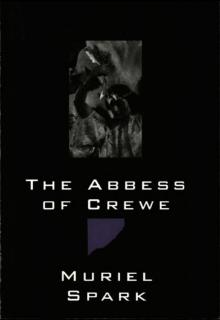 The Abbess of Crewe: A Modern Morality Tale
The Abbess of Crewe: A Modern Morality Tale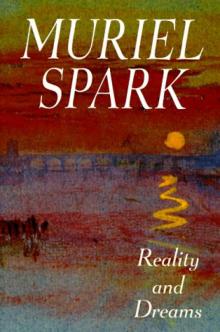 Reality and Dreams
Reality and Dreams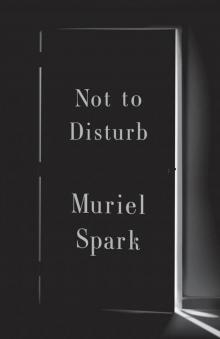 Not to Disturb
Not to Disturb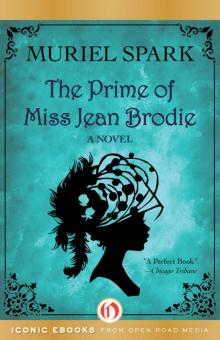 The Prime of Miss Jean Brodie
The Prime of Miss Jean Brodie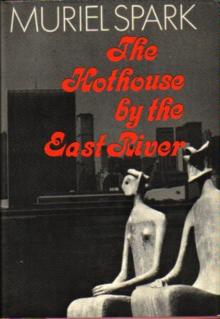 The Hothouse by the East River
The Hothouse by the East River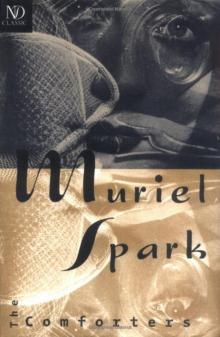 The Comforters
The Comforters (1958) Robinson
(1958) Robinson Unknown
Unknown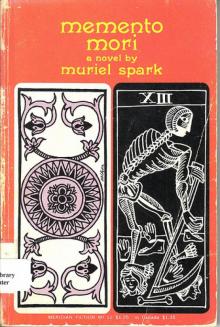 Memento Mori
Memento Mori The Finishing School
The Finishing School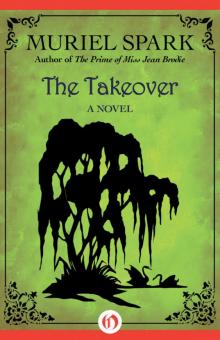 The Takeover
The Takeover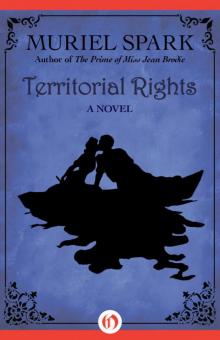 Territorial Rights
Territorial Rights The Complete Short Stories
The Complete Short Stories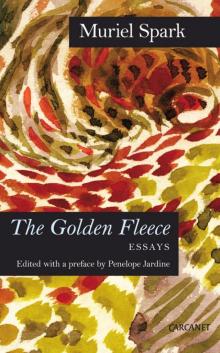 The Golden Fleece: Essays
The Golden Fleece: Essays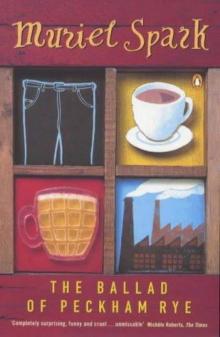 The Ballad of Peckham Rye
The Ballad of Peckham Rye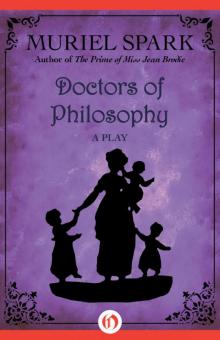 Doctors of Philosophy: A Play
Doctors of Philosophy: A Play The Mandelbaum Gate
The Mandelbaum Gate Loitering With Intent
Loitering With Intent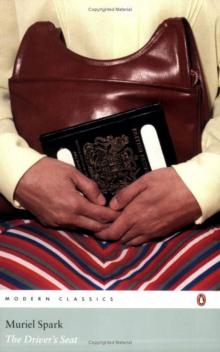 The Driver's Seat
The Driver's Seat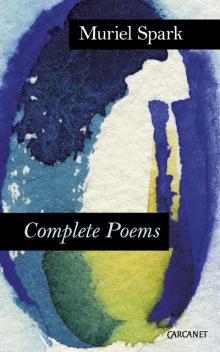 Complete Poems: Muriel Spark
Complete Poems: Muriel Spark Symposium
Symposium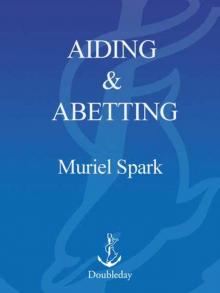 Aiding and Abetting
Aiding and Abetting The Golden Fleece
The Golden Fleece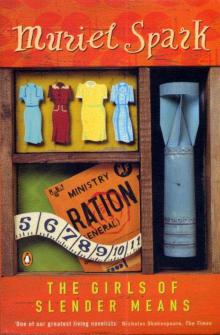 The Girls of Slender Means
The Girls of Slender Means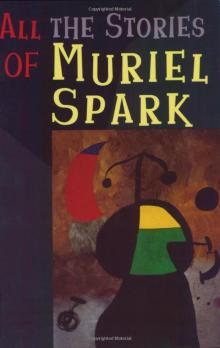 Alice Long’s Dachshunds
Alice Long’s Dachshunds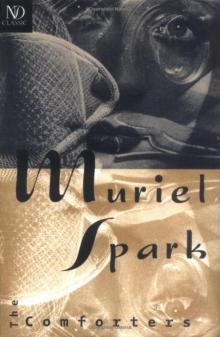 (1954) The Comforters
(1954) The Comforters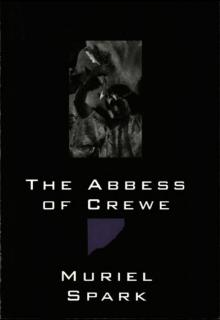 The Abbess of Crewe
The Abbess of Crewe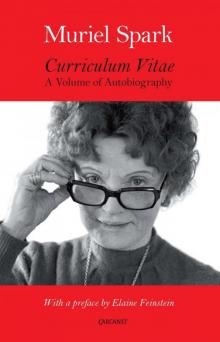 Curriculum Vitae
Curriculum Vitae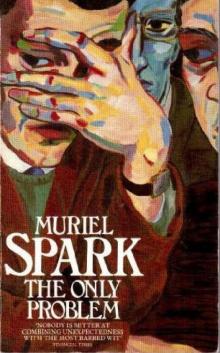 The Only Problem
The Only Problem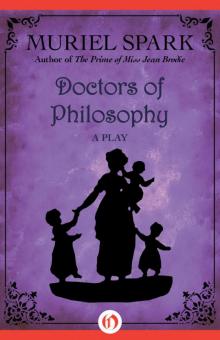 Doctors of Philosophy
Doctors of Philosophy